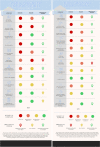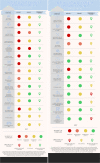Evaluating the feasibility of the Community Score Card and subsequent contraceptive behavior in Kisumu, Kenya
- PMID: 36280808
- PMCID: PMC9592126
- DOI: 10.1186/s12889-022-14388-y
Evaluating the feasibility of the Community Score Card and subsequent contraceptive behavior in Kisumu, Kenya
Abstract
Background: Women seeking family planning services from public-sector facilities in low- and middle-income countries sometimes face provider-imposed barriers to care. Social accountability is an approach that could address provider-imposed barriers by empowering communities to hold their service providers to account for service quality. Yet little is known about the feasibility and potential impact of such efforts in the context of contraceptive care. We piloted a social accountability intervention-the Community Score Card (CSC)-in three public healthcare facilities in western Kenya and use a mix of quantitative and qualitative methodologies to describe the feasibility and impact on family planning service provision.
Methods: We implemented and evaluated the CSC in a convenience sample of three public-sector facility-community dyads in Kisumu County, Kenya. Within each dyad, communities met to identify and prioritize needs, develop corresponding indicators, and used a score card to rate the quality of family planning service provision and monitor improvement. To ensure young, unmarried people had a voice in identifying the unique challenges they face, youth working groups (YWG) led all CSC activities. The feasibility and impact of CSC activities were evaluated using mystery client visits, unannounced visits, focus group discussions with YWG members and providers, repeated assessment of score card indicators, and service delivery statistics.
Results: The involvement of community health volunteers and supportive community members - as well as the willingness of some providers to consider changes to their own behaviors-were key score card facilitators. Conversely, community bias against family planning was a barrier to wider participation in score card activities and the intractability of some provider behaviors led to only small shifts in quality improvement. Service statistics did not reveal an increase in the percent of women receiving family planning services.
Conclusion: Successful and impactful implementation of the CSC in the Kenyan context requires intensive community and provider sensitization, and pandemic conditions may have muted the impact on contraceptive uptake in this small pilot effort. Further investigation is needed to understand whether the CSC - or other social accountability efforts - can result in improved contraceptive access.
Keywords: Contraception; Kenya; Mystery clients; Provider bias; Quality of care; Social accountability; Sub-Saharan Africa.
© 2022. The Author(s).
Conflict of interest statement
We declare no competing interest.
Figures



Similar articles
-
A cross-country qualitative study on contraceptive method mix: contraceptive decisionmaking among youth.Reprod Health. 2021 May 25;18(1):105. doi: 10.1186/s12978-021-01160-5. Reprod Health. 2021. PMID: 34034757 Free PMC article.
-
Contraceptive method denial as downward contraceptive coercion: A mixed-methods mystery client study in Western Kenya.Contraception. 2022 Nov;115:53-58. doi: 10.1016/j.contraception.2022.06.014. Epub 2022 Jun 29. Contraception. 2022. PMID: 35779578 Free PMC article.
-
Pathways to increased coverage: an analysis of time trends in contraceptive need and use among adolescents and young women in Kenya, Rwanda, Tanzania, and Uganda.Reprod Health. 2017 Oct 17;14(1):130. doi: 10.1186/s12978-017-0393-3. Reprod Health. 2017. PMID: 29041936 Free PMC article.
-
Participatory approaches involving community and healthcare providers in family planning/contraceptive information and service provision: a scoping review.Reprod Health. 2016 Jul 22;13(1):88. doi: 10.1186/s12978-016-0198-9. Reprod Health. 2016. PMID: 27449128 Free PMC article.
-
Provider Bias in Family Planning Services: A Review of Its Meaning and Manifestations.Glob Health Sci Pract. 2019 Sep 26;7(3):371-385. doi: 10.9745/GHSP-D-19-00130. Print 2019 Sep. Glob Health Sci Pract. 2019. PMID: 31515240 Free PMC article. Review.
Cited by
-
Using the 5C Vaccine Hesitancy Framework to Elucidate and Measure Contraceptive Acceptability in sub-Saharan Africa.Glob Health Sci Pract. 2024 Dec 20;12(6):e2400210. doi: 10.9745/GHSP-D-24-00210. Print 2024 Dec 20. Glob Health Sci Pract. 2024. PMID: 39586642 Free PMC article.
-
Comparative perceptions of wait times for family planning services among contraceptive users and mystery clients in Kisumu, Kenya: a mixed methods analysis.BMC Health Serv Res. 2025 Aug 30;25(1):1155. doi: 10.1186/s12913-025-13278-4. BMC Health Serv Res. 2025. PMID: 40885988 Free PMC article.
-
Impact of health system governance on healthcare quality in low-income and middle-income countries: a scoping review.BMJ Open. 2023 Dec 11;13(12):e073669. doi: 10.1136/bmjopen-2023-073669. BMJ Open. 2023. PMID: 38081664 Free PMC article.
References
-
- Ministry of Health, Division of Family Health, Family Planning Program. National Family Planning Guidelines for Service Providers. 6th ed. Nairobi: RMHSU; 2018.
-
- National Bureau of Statistics Nairobi K . Republic of Kenya Kenya Demographic and Health Survey 2014. 2015.
Publication types
MeSH terms
Substances
Grants and funding
LinkOut - more resources
Full Text Sources
Medical
Miscellaneous

